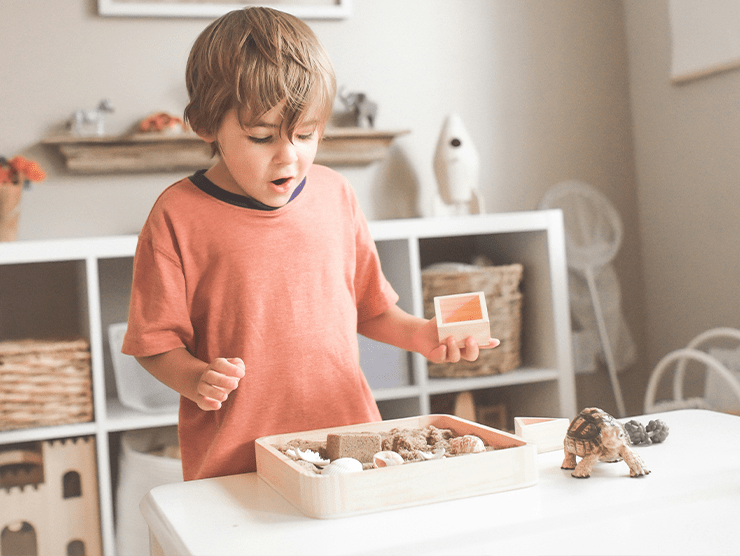6 fun preschool math activities
Math doesn’t have to be intimidating. In fact, it can, and should be fun, intriguing and relevant. These six preschool activities can help you introduce your child to many different concepts including counting, sorting, patterns, and geometric shapes. Ready to get started? Use everyday moments with your child and materials you have around the house to participate in these engaging preschool math activities, and help your child become excited for math.
1. Turn mealtime into math time
Cooking, baking, snack time, lunch-prep time — not only is cooking fun, but it is also educational! When preparing a snack, ask your child to put five baby carrots and five apple slices on a plate. When it’s time to get tomorrow’s lunch ready, take out two containers or bags and ask your child to put two graham crackers in one, and eight cubes of cheese in the other. Baking with a simple recipe? Read the recipe out loud and talk about the different measurements. When it’s time to add one cup of flour or one teaspoon of salt, help your child pick out the right measuring cup and spoon and fill them up.2. Sort stuffed animals into groups
What do Bob the bear and Harry the horse have in common? They’re both brown! Help your child sort stuffed animals into different groups. First, sort by color. Then, encourage your child to think about where different animals live in the wild, and sort by habitat. You can also sort by number of legs, size, tail vs. no tail, pointy ears vs. floppy ears, and more.3. Create patterns
Use colored blocks as you build together, plastic bears, or other small items to introduce your child to the concept of patterns. Have your child make a pile of red blocks while you make a pile of yellow. Then, lay a yellow one down on the table, ask your child to follow with red, and repeat. Explain the yellow, red, yellow, red sequence to your child and switch it up with other colors. Once you’ve got the basics down, you can move on to something a little harder, such as yellow, yellow, red, yellow, yellow, red. You can also incorporate patterns into your next outdoor adventure by using stones, leaves, sticks and other items found in nature by color, size, or texture.4. Play a simple board game
Rolling the dice, moving the pieces, handing out the cards--playing simple board games not only assists your child in the development of math concepts such as counting, ordering and sequencing, matching and classifying, but allows them to strengthen life skills such as focus, patience, turn taking, and a sense of accomplishment.5. Go on a shape hunt around the house and outside
Work with your child to draw a circle, oval, square, rectangle, triangle, diamond, star, and heart on a sheet of paper. Then, walk around your house, the backyard, the neighborhood, or a nearby park and look for these shapes in different rooms, on street signs, on houses and buildings, and in nature — and make sure to name each shape as you go. Climbing to the top of the structure to find a square? Work in the use of prepositional words such as under/over in/out, up/down as they go!6. Read high-quality children's books
Have your child select their favorite book and spend quality time reading together. While reading, illustrate how the story has a beginning, middle and end. This helps your child develop an understanding of story sequences and ordering of events over time.
What should you look for in a preschool activity?
Look for activities that encourage active participation, exploration, and interaction with peers. These activities should promote all areas of a preschooler’s development:
- Physical development: Activities that involve gross motor skills, such as climbing, running, and jumping, as well as fine motor skills, such as cutting, pasting, and drawing.
- Emotional development: Activities that encourage self-expression, social interaction, and emotional regulation, such as pretend play, music, and art.
- Cognitive development: Activities that promote problem-solving, critical thinking, and creativity, such as puzzles, games, and building activities.
Remember to choose activities that are developmentally appropriate and tailored to the individual needs and interests of your child. They should be engaging, meaningful and fun, creating a positive learning experience.
Why is math so important?
Math helps us develop logical thinking skills and problem-solving strategies that can be applied to various challenges. Understanding math concepts is crucial in adulthood for managing personal finances and making informed decisions.
In addition to practical applications, there are also cognitive benefits. Math fosters critical thinking skills, allowing us to analyze information, evaluate arguments, and make judgments.
By fostering a love for math from a young age and providing children with opportunities for hands-on learning, we can help children develop a strong foundation for future success.
What are the benefits of math for preschoolers?
- Problem-solving: Math helps children develop critical thinking skills and learn how to approach challenges creatively.
- Logical thinking: Math activities strengthen children’s ability to reason and make connections.
- Creativity: early math experiences encourage children to explore various ways to solve a problem, encouraging flexible thinking.
- Pattern recognition: Recognizing patterns is essential for understanding mathematical concepts and other areas of learning.
- Spatial awareness: Math can help children develop a better understanding of space and relationships between objects.
- Confidence: As children become proficient in math, they gain confidence in their abilities.
It is important to note that parents’ mindset about math strongly influences children. Go into these activities with a positive, open mind, ready to learn alongside your child, despite if you once thought “you weren’t good at math”.
Whether you want to build on a concept your child is learning in preschool, your child has started asking about different shapes, or you simply need pretend play ideas you can turn to during downtime, take advantage of these math activities you can do at home.





